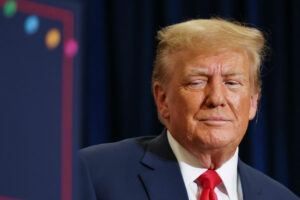
Philippines told to prepare for Trump presidency
By Kyle Aristophere T. Atienza, Reporter
THE PHILIPPINES should ensure ironclad security arrangements with its allies in case of a potential Trump presidency that could force the US to scale back its presence in the Indo-Pacific region despite China’s increased assertiveness, according to a geopolitical expert.
While the US is unlikely to totally disengage from the region, it might scale back its presence, a move that could have serious implications for the Philippines and other small states that have a sea dispute with China, Enrico Cau, an associate researcher at the Taiwan Center for International Strategic Studies, said in a reply to questions sent via Facebook Messenger.
China, which claims the South China Sea almost in its entirety, might see decreased US presence in the region as an “implicit green light to pursue its territorial ambitions across the region unchallenged,” he said. “It may sow a wave of insecurity among smaller powers unable to build sufficient deterrence.”
This could create a leadership vacuum in a region that is averse to formal defense coalitions, he added.
Former US President Donald John Trump, who pushes for an America first policy, has moved closer to the Republican Party’s presidential nomination for the 2024 elections after defeating former Governor Nikki Haley in her home state, South Carolina, on Saturday.
The US presidential election is nine months away and countries are now preparing for the potential consequences of another Trump presidency, which could mean US abandonment of Ukraine and Taiwan and a transactional approach to foreign policy.
A Trump presidency might keep the level of US engagement in the region “while devolving costs and responsibilities of regional security to regional partners,” Mr. Cau said.
The Philippines has taken its security alliance with the US to the next level amid an increasingly expansionist China. There is also increased tension between China and Taiwan, which it claims as its own territory.
In February last year, President Ferdinand R. Marcos, Jr. gave Washington access to four more military bases on top of the five existing sites.
The Trump government through former Secretary of State Mike Pompeo in 2019 vowed to defend the Philippines in case of an attack by China, a commitment that US President Joseph R. Biden has reiterated.
Mr. Pompeo during his visit to Manila in March 2019 said the Philippines, like other countries in the region, must do its part to keep the South China Sea free and open.
“The only thing I know about Trump is that he’s against China,” Philippine Coast Guard spokesman Jay Tristan Tarriela told a forum last week. “Our alliance with the US will not be negated or affected by having Trump again in the White House.”
US VOID
Both Mr. Trump and Mr. Biden view China as a threat, said Joshua Bernard B. Espeña, vice president at Manila-based International Development and Security Cooperation. “What might differ is how Trump views unilateralism as the main approach against China,” he said via Messenger chat.
Under the Trump government, the US renamed its Pacific Command to the Indo-Pacific Command in recognition of the increasing connectivity between the Indian and Pacific oceans, Mr. Espeña said.
Last week, the US and Philippine military held the air component of their Maritime Cooperative Activity’s third iteration that started this month. The two forces held their first joint patrols in November last year.
“We can deduce that the alliance will still be fine at the operational level,” Mr. Espeña said. “It just so happened that Trump’s years coincided with ex-President Rodrigo R. Duterte’s tenure,” he added, noting that Mr. Marcos, whose family spent years in exile in the US, has “good personal relations with the American elite.”
Don Mclain Gill, who teaches foreign relations at De La Salle University, said the US under another Trump presidency would likely want its allies in the region including the Philippines to assume more responsibility.
“Under the previous Philippine administration, Manila often gave the cold shoulder to Washington,” he said via Messenger chat. “Manila will have to make sure that it does not get the shorter end of the bargain.”
Mr. Trump likes industrious allies, Mr. Espeña said. “I think that joint patrols and other relevant exchanges would proceed. Should Trump win the presidency, the Philippines should do what it always does: do more and contribute more to the alliance.”
Mr. Cau said Japan could fill the void in case the US scales back its commitment to the region.
“This means that for the Philippines, tightening relations with Japan may be a good idea,” he said. “But there are always limitations. The country may get too involved in conflicts that it should avoid.”
The Philippines should continue cooperating with the US “while also preserving adequate red lines in terms of how far such cooperation should go,” Mr. Cau said, adding that it should accept the fact that US support might not last forever.
The Philippines should set up a network of defense partners to share costs and know-how in the defense sector, he added, citing the path taken by Japan, Indonesia and South Korea.



